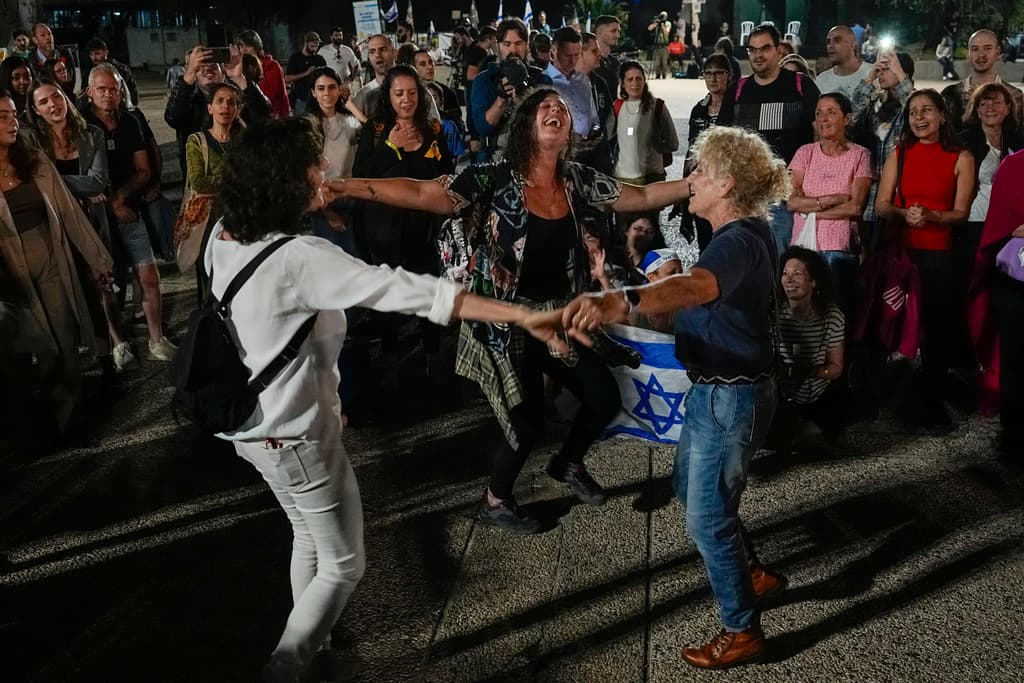Most Important Feature of Hostage Deal Is the Four-Day Pause, Which Hamas Will Use To Try To Break the Will of the Jewish State
Hamas clearly is milking the cruelty of the drama it has created — as part of its plan to play for time, using hostages as bait so that pressure will grow on Israel to leave Hamas in charge of Gaza.

Israel is celebrating the release of a small number of the 236 hostages held in Gaza for 49 days. Yet can Hamas use the remaining hostages to counter Jerusalem’s strategic goal of dismantling and eradicating the terrorist organization?
Thirteen Israeli children and women arrived in the country immediately after sundown, local time. Their release was welcomed by the entire country, even as many hostages were left behind. Ten Thai nationals and one Filipino who were abducted on October 7 were also released as part of a separate deal Bangkok made with Hamas’s benefactors at Tehran.
The deal that facilitated the Friday release was negotiated between Israel and Qatar, which hosts the Hamas leadership, and was sponsored by America and Egypt. If completed, the deal would see the release of 50 Israeli children and women over the course of four days. Three times as many Palestinians, convicted of attempted murder and other crimes or incarcerated pending trial, would be released in return. Additional goods and supplies would be delivered to Gaza.
For Hamas, though, the most important component of the deal is the four-day military pause as swaps are conducted. Keen observers of Israeli life, Hamas leaders are well aware that the release of prisoners is etched in the country’s ethos. Abductions were a crucial part of the terrorists’ planning for the October 7 assault.
Yet that day’s massacre has united Israelis behind the need to extirpate the terrorist organization and forever remove the threat it represents. Hamas’s plan is to use the hostages to break Israel’s will, and keep everyone in the dark in respect of its intentions.
As President Biden praised the first phase of the deal he helped broker, he made clear that even he was unsure, as of late afternoon, whether the second phase would be completed. Later, though, Israel received the list of names of hostages to be released Saturday.
Hamas clearly is fully milking the cruelty of the drama it has created. It cynically plans to use the most potent weapon it possesses to play for time, hoping that as long as it keeps dangling the hostages as bait, pressure will grow on Israel to end the war and leave Hamas in charge of Gaza.
“We all hope that this truce will lead to a chance to start a wider work to achieve a permanent truce,” Qatar’s foreign ministry spokesman, Majed Al-Ansari, told reporters Thursday in a press conference meant to underline Doha’s diplomatic prowess. Ending the war is Hamas’s ultimate goal and also the hope of its closest ally, Doha.
Israeli officials concede that the four-day cessation of military activities could be extended. For each 10 hostages released, another day could be added, they say. At the same time, they vow that the military operation to obliterate Hamas remains their top priority.
Hamas’s military losses were the only reason it started negotiating the release of hostages in the first place, Israelis believe, as they vow to maintain that pressure. “We will continue to fight, and to do everything to release the hostages,” the defense minister, Yoav Gallant, said Friday.
“We are determined to bring all abductees back,” Prime Minister Netanyahu said after confirming the release Friday, adding, “we are determined to reach all our war goals” — including the destruction of Hamas.
The longer the Israel Defense Forces were to pause, though, the more difficult it would be to reignite the military campaign. As Hamas seeks to force Israel into a Sophie’s Choice regarding the women, children, elderly, and other hostages to be released, in many world quarters October 7 is already relatively forgotten, with suffering at Gaza capturing headlines.
Two European leaders attempted to hog world cameras Friday at Gaza’s Rafah crossing, where hostages were scheduled to be released. While uninvolved in the hostage negotiations, the two — Prime Ministers De Croo of Belgium and Sánchez of Spain — held a press conference ignoring the release of children and elderly women and crowing instead about aid trucks entering Gaza. Both called for the ceasefire to become permanent.
While several governments on the continent are more Israel-friendly than Madrid and Brussels, an increasing number of Europeans are likely to call for ending the war. Meanwhile, even as Arab streets are boiling, several Mideast countries are quietly urging Israel to finish off Hamas.
Gulf countries have made peace with Israel in part because of its image of power. In praising the hostage deal on Friday, Mr. Biden for the first time acknowledged that his efforts to add Saudi Arabia to the Abraham Accords may have motivated the Hamas attack. Yet, if the IDF fails to finish off Hamas, even Arab countries that already have relations could turn their backs on Israel.
Mr. Biden, in his speech Friday, made clear that Hamas has no room in his vision of “two states for two people.” For now, he seems to maintain full support of Israel’s plan to root out and destroy the group. As Hamas’s hostage strategy drags on, though, even America’s support might weaken.

